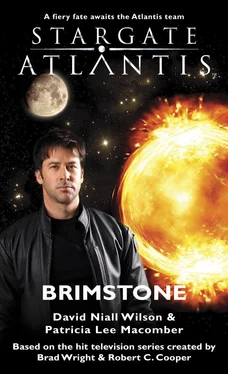David Niall Wilson, Patricia Lee Macomber
StarGate: Atlantis
Brimstone
The audience murmured in anticipation as a tall, gray-haired man with thick spectacles and a cloud of puffy hair stepped to the podium. There was a tinkle of crystal and a scuffle of chairs as the night reached its climactic moment. The speaker cleared his throat, and the crowd grew silent. He shuffled some note cards and glanced up at the audience .
“I believe you all know why we are here.” His voice was dry and brittle, but it carried well. “Tonight we will honor our best and our brightest. I venture to say that if we tried to calculate the combined IQ of this room, we’d need a very powerful computer — but even in such company, one stands out clearly. We here at The Academy of Science bestow this honor annually, and I’m pleased to report that for the first time in our history, the voting is unanimous. Few have distinguished themselves so clearly, and in so many varied fields. I could go on, as many of you know…”
He paused and there was a ripple of laughter.
“But I will not. Without further ado, I’d like to introduce our keynote speaker, a woman we all know and admire, Dr. Elizabeth Weir.”
There was an enthusiastic burst of applause. From behind the old man, a slender dark haired woman in a shimmering low-cut evening gown stepped forward. In stark contrast to the first speaker, she was tall, vibrant and attractive, catching the eye of each of those seated below her. She smiled brightly and waved to a few acquaintances in the front rows. She held no notes, but placed her hands almost provocatively on the podium and leaned down to the microphone.
“I am pleased,” she said, “and honored, to have been chosen to introduce one of Earth’s finest minds — possibly the most brilliant physicist we’ve known — certainly the most brilliant in my lifetime. This is a man I have served with proudly, who has saved my life on countless occasions, and who I consider to be the foremost human expert on Ancient technologies. I’d like to tell you all a few things you might not already know about this amazing man…”
As she spoke, Dr. Rodney McKay rose slowly from his seat in the back of the room. He knew she would go on for a while, praising his mind, but it was her smile he was really interested in. He was certain she was looking directly at him as she spoke. He thought, maybe, there was something more than usual in that smile — something inviting. It was the most important night of his life, and he intended to milk it for everything it was worth.
He worked his way down the row of seats toward the center aisle, apologizing graciously to those he passed and shaking a few hands. They all knew him. Many of them owed their own careers and research to his work. It was the culmination of a lifetime of research and experimentation.
Suddenly, Dr. Weir’s speech was interrupted by a sharp buzzing tone. Rodney spun, confused, searching the room for the source of the sound, but he could find nothing. He shook his head, and as he did, the room faded. His darkened quarters came into focus, and the blaring sound resolved itself into the buzzer on his door.
He rolled over, checked the time — 0300, then rolled back and closed his eyes. It wasn’t until the third buzz that he rolled off his bunk, wrapped up in his blanket, and stepped to the door. He pressed the Intercom button.
“Who is it?”
“It’s Cumby, sir.” The voice was bright, cheerful, and irritated Rodney through to the bone.
“Cumby, do you know what time it is? There’s a device in the lab — you’ll know it from the digital readout with all the numbers and pretty colors? It’s called a clock, and we use it to decide when is, and when is not, a good time to wake people up.”
“Colonel Sheppard has something on the long range scan that he thinks you ought to see.”
Rodney glanced back at his rumpled pillow longingly, and then sighed. “This had better be good.”
He dressed quickly, ran his hand through his hair in place of a comb and blearily rubbed sleep from his eyes. A moment later, he stepped into the hall and turned toward the lab. Not many others were up and about, a fact Rodney considered the one positive thing about three o’clock in the morning.
When he reached the lab, he saw Cumby, who was one of his newest lab technicians, bent over a monitor screen. The young man was tall and thin, completely bald, and at that moment the most irritating thing in Dr. McKay’s universe — next to the slender, dark haired officer standing beside Cumby. Rodney stepped up beside Sheppard and glanced down at the monitor.
“What is it that’s so fascinating you dragged me out of a sound sleep?”
“Look for yourself.”
Rodney was already looking. He pushed Cumby out of the way and scanned the image on the screen. He frowned, twisted a number of knobs in quick succession, and stared again.
“I’ve recalibrated the scan three times,” Cumby said. “No matter what I do, the readings on MC4-502 are still way off.”
Rodney glanced up at the young man and scowled.
“You think?” he said. “I don’t know why you recalibrated. Wait…I know. You looked at the screen, applied all the second-rate scientific wit you could muster, and concluded that maybe the scanner was exactly accurate on 99.99 percent of the objects it’s reading, but a glitch in the system caused it to be inaccurate just for that one moon. Brilliant.”
Cumby started to answer, but Rodney ignored him. He seated himself in front of the scanner and zeroed in on MC4-502, the fourth moon around a distant planet.
“What do you think?” Sheppard said, leaning in over Rodney’s shoulder.
Rodney stiffened, tilted his head, and said, “What do I think? I think, in the thirty seconds I’ve had to think about it, that MC4-502 has left its orbit. I think it’s very early in the morning, it’s difficult to concentrate with you leaning over my shoulder, and that as far as I can tell, you’ve wasted my night’s sleep — and a perfectly wonderful dream, I might add — for a simple astral anomaly I could have studied over coffee in about three hours.”
Colonel Sheppard, who was grinning widely, took a sip of coffee from the mug he held and waited.
“I think, in fact,” Rodney continued, “that — ”
He stopped. His hands returned to the controls, and flew from keyboard to knobs with uncanny speed and precision.
“Oh,” he said, pushing back and away, nearly causing Sheppard to spill his coffee, “this is not good.”
“I knew you were gonna say that,” Sheppard said.
Rodney paid no attention. He’d changed screens, brought up a tracking grid and was plotting MC4-502’s course through its solar system. He punched in some numbers, cleared the screen, punched them in again, and spun back to face the Colonel with a frown. “It’s headed straight into the sun.”
“That happens, right?”
“No,” Rodney said, “it doesn’t. Not that quickly. Sure, over time orbits can erode and break down. Things can shift — a really big meteor could strike the moon’s surface and knock it off course, but this?” He waved his hand toward the screen. “I’ve never seen anything like this. If I didn’t know better, I’d say the thing had been flown off course on purpose.”
“Is there any danger to Atlantis?”
“Not per se,” Rodney said. “It’s thousands of light years away. But,” he frowned and punched more keys, “I guess it depends on who’s flying it, doesn’t it?”
He turned back to the computer screen and began typing furiously. After a few moments, he glanced up. Colonel Sheppard was gone and Cumby stood off to one side looking very uncomfortable, clearly uncertain whether he should try to regain his seat at the console, or even speak.
Читать дальше












